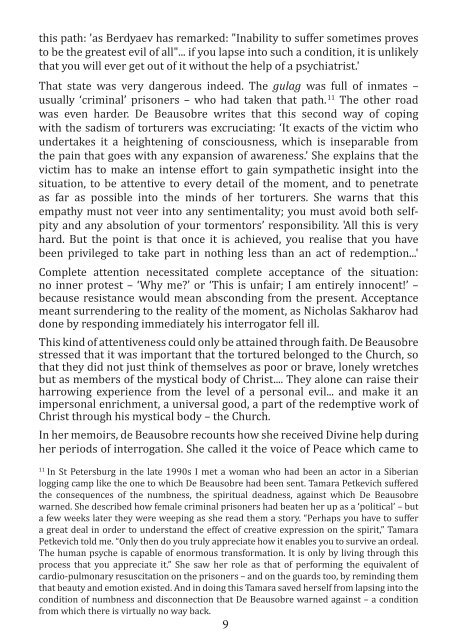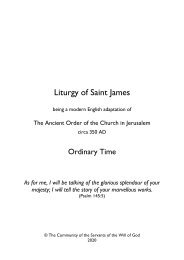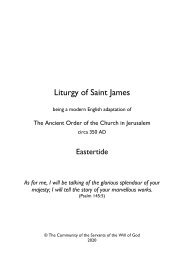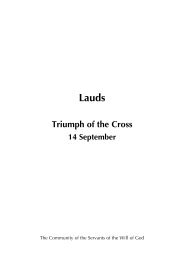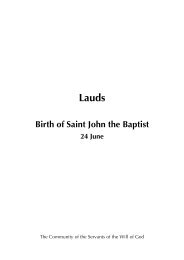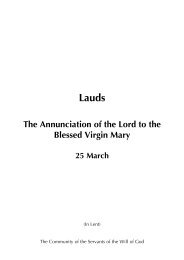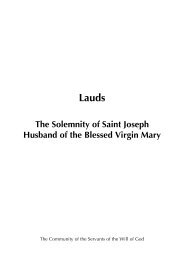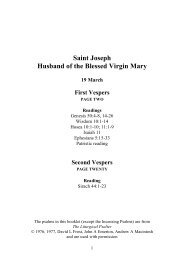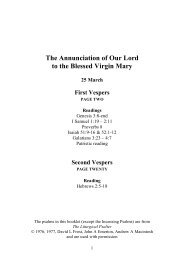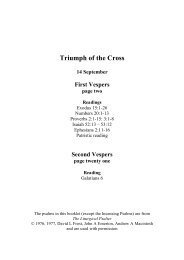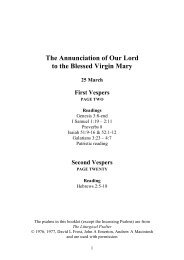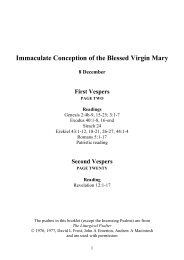In Praise of Holy Women
'Come to the Father' is the official journal of the Anglican Community of the Servants of the Will of God, Sussex, England, a contemplative monastic order for men and women founded in 1938. The aim of the journal is to maintain a dialogue between the Churches - East and West. This issue features articles on Evelyn Underhill, Julia DeBeausobre, Therese of Lisieux, Sister Joanna Reitlinger and Dorothy Day.
'Come to the Father' is the official journal of the Anglican Community of the Servants of the Will of God, Sussex, England, a contemplative monastic order for men and women founded in 1938. The aim of the journal is to maintain a dialogue between the Churches - East and West. This issue features articles on Evelyn Underhill, Julia DeBeausobre, Therese of Lisieux, Sister Joanna Reitlinger and Dorothy Day.
Create successful ePaper yourself
Turn your PDF publications into a flip-book with our unique Google optimized e-Paper software.
this path: 'as Berdyaev has remarked: "<strong>In</strong>ability to suffer sometimes proves<br />
to be the greatest evil <strong>of</strong> all"... if you lapse into such a condition, it is unlikely<br />
that you will ever get out <strong>of</strong> it without the help <strong>of</strong> a psychiatrist.'<br />
That state was very dangerous indeed. The gulag was full <strong>of</strong> inmates –<br />
usually ‘criminal’ prisoners – who had taken that path. 11 The other road<br />
was even harder. De Beausobre writes that this second way <strong>of</strong> coping<br />
with the sadism <strong>of</strong> torturers was excruciating: ‘It exacts <strong>of</strong> the victim who<br />
undertakes it a heightening <strong>of</strong> consciousness, which is inseparable from<br />
the pain that goes with any expansion <strong>of</strong> awareness.’ She explains that the<br />
victim has to make an intense effort to gain sympathetic insight into the<br />
situation, to be attentive to every detail <strong>of</strong> the moment, and to penetrate<br />
as far as possible into the minds <strong>of</strong> her torturers. She warns that this<br />
empathy must not veer into any sentimentality; you must avoid both selfpity<br />
and any absolution <strong>of</strong> your tormentors’ responsibility. 'All this is very<br />
hard. But the point is that once it is achieved, you realise that you have<br />
been privileged to take part in nothing less than an act <strong>of</strong> redemption...'<br />
Complete attention necessitated complete acceptance <strong>of</strong> the situation:<br />
no inner protest – ‘Why me?’ or ‘This is unfair; I am entirely innocent!’ –<br />
because resistance would mean absconding from the present. Acceptance<br />
meant surrendering to the reality <strong>of</strong> the moment, as Nicholas Sakharov had<br />
done by responding immediately his interrogator fell ill.<br />
This kind <strong>of</strong> attentiveness could only be attained through faith. De Beausobre<br />
stressed that it was important that the tortured belonged to the Church, so<br />
that they did not just think <strong>of</strong> themselves as poor or brave, lonely wretches<br />
but as members <strong>of</strong> the mystical body <strong>of</strong> Christ.... They alone can raise their<br />
harrowing experience from the level <strong>of</strong> a personal evil... and make it an<br />
impersonal enrichment, a universal good, a part <strong>of</strong> the redemptive work <strong>of</strong><br />
Christ through his mystical body – the Church.<br />
<strong>In</strong> her memoirs, de Beausobre recounts how she received Divine help during<br />
her periods <strong>of</strong> interrogation. She called it the voice <strong>of</strong> Peace which came to<br />
11<br />
<strong>In</strong> St Petersburg in the late 1990s I met a woman who had been an actor in a Siberian<br />
logging camp like the one to which De Beausobre had been sent. Tamara Petkevich suffered<br />
the consequences <strong>of</strong> the numbness, the spiritual deadness, against which De Beausobre<br />
warned. She described how female criminal prisoners had beaten her up as a ‘political’ – but<br />
a few weeks later they were weeping as she read them a story. “Perhaps you have to suffer<br />
a great deal in order to understand the effect <strong>of</strong> creative expression on the spirit,” Tamara<br />
Petkevich told me. “Only then do you truly appreciate how it enables you to survive an ordeal.<br />
The human psyche is capable <strong>of</strong> enormous transformation. It is only by living through this<br />
process that you appreciate it.” She saw her role as that <strong>of</strong> performing the equivalent <strong>of</strong><br />
cardio-pulmonary resuscitation on the prisoners – and on the guards too, by reminding them<br />
that beauty and emotion existed. And in doing this Tamara saved herself from lapsing into the<br />
condition <strong>of</strong> numbness and disconnection that De Beausobre warned against – a condition<br />
from which there is virtually no way back.<br />
9


